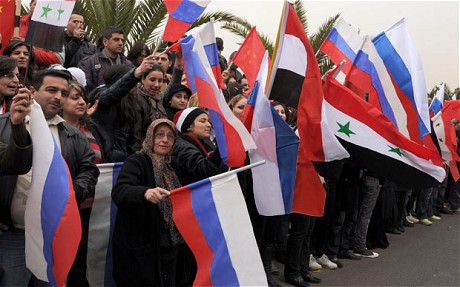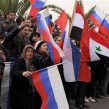
Moscow Mixes Profit with Principle in Syria
Publication: Eurasia Daily Monitor Volume: 9 Issue: 79
By:

To hear Moscow tell it, Russia’s aims in Syria are only motivated by principle. It opposes the use of ambiguous UN resolutions to permit intervention to forcibly democratize a country, an outcome that it believes invariably leads to protracted war. Russia is also against forcing out Bashar al-Assad. Moscow fears he will be replaced by a Sunni Arab regime that may then become a terrorist Islamist regime. As a result, Russian officials and many leading Russian experts invariably repeat these points in their public presentations (Interfax, March 30; Rossiya 24, March 19). But, behind the headlines and official meetings, the truth is rather more prosaic. It is quite clear that Moscow opposes any autonomous democratic politics whether it occurs in Libya, Syria or closer to home. Moscow fears that such examples will reverberate throughout Russia and the CIS as they did in the previous presidential election. In addition, Russia certainly opposes any extension of US or NATO power into the Middle East regardless of the outcome. Moreover, realizing that NATO shows no sign of intervening, Russia also now sees opportunities to grab economic and political advantages for itself and is not afraid to show force in its support for the Assad regime.
This is not merely a question of continuing to sell weapons as it is continuing to do. Once again, Moscow has shown its intention to deploy naval warships to the Syrian coast on a permanent basis (RIA Novosti, April 13). Earlier deployments in December 2011 were temporary, but now that Moscow realizes NATO will not intervene it feels it can pretend to show force to deter NATO in the belief that this will win it Syrian support and show that it stands behind its allies. Previously, Moscow said that its special forces ship Ekvator was deployed merely to observe developments, but it now seems like this will be a more permanent deployment (Nezavisimaya Gazeta Online, March 22).
In first trying to force Syria’s opposition to disarm and now to support the Annan plan of former UN Secretary General Kofi Annan – while Assad’s forces continue to shell and attack them – also indicates that Moscow has doubled down on its support for Assad. Clearly Russia’s support for the Annan plan, even as the Syrian government openly violates it, demonstrates Moscow’s attempt to impose that solution rather than leave the door open to the possibility of future foreign intervention by NATO or other states. Believing that its intransigence has been rewarded since NATO will probably not intervene and the rebels are disorganized and outgunned, Foreign Minister Lavrov has taken the diplomatic offensive. In numerous statements, he has denounced the US Friends of Syria initiative as being unilateral. The Russian Foreign Minister has repeatedly insisted that Assad has the support of Syria’s majority and that his latest actions somehow indicate reforms. Finally, Lavrov has stated that there is no alternative to the UN – where Russia can block any action, even resolutions condemning mass murder, thanks to Moscow’s veto-wielding permanent Security Council seat (Interfax, April 2; mid.ru, April 2; Interfax, March 20, 23, 24).
Russia’s adamantine stance on Syria is cloaked in the rhetoric of vital interests, international law, basic foreign policy principles and defense against terrorism. In actuality, however, it reflects Vladimir Putin’s contempt for the West and Moscow’s perception of its irresolution. Furthermore, it also reflects the Russian leadership’s abiding fear that the Arab Spring will eventually come to the CIS if not Russia. And the government in Moscow may not be able to so indiscriminately shoot its own people as has Assad. Despite warnings to the contrary, there has been no mass repression of the opposition to Putin since his re-election, a sign of his confidence in his present status, but also of the overall uncertainty of the situation.
But perhaps the most cynical aspect of Russian policy here – beyond its hypocrisy, invocation of the old colonialist tactic of gunboat diplomacy, and open contempt for Sunni Arab states like Saudi Arabia and Qatar who strongly oppose Assad’s rampages – is its shameless quest for material gain out of this crisis. Thus on March 17, Mohammad al-Kishto, Chairman of the Federation of Syrian Chambers of Commerce, announced that Gazprom would take over the Croatian energy company Ina’s oil and gas fields in Syria worth billions of dollars. This allows Syria to claim that it has not been hurt by the departure of foreign oil and gas firms because of the availability of Russian competition (Vecerniji.hr, March 17). More to the point, these oil and gas fields are undoubtedly the price exacted by Moscow for its services rendered to Damascus. Indeed this second example of neo-colonialist takeover should hardly surprise anyone who closely follows Putin’s polices. In his Question and Answer session with the State Duma on April 11, the outgoing Russian Prime Minister asserted that Moscow has invested repeatedly in the Middle East not out of any ideological solidarity with them but in order to make money and advance its interests (premier.gov.ru, April 11). Clearly, in this case Moscow charged a price for its support of Damascus and it has now been paid.
The cynicism of this policy may shock many in the West, but it should not shock anyone who knows the mentality of the Russian elite. As Charles de Gaulle observed, states are “cold monsters.” Putin’s Russia is, however, rather colder than many others, and at the same time more frightened by the prospect of autonomous public participation in politics. After all, Sergei Lavrov in 2007 told the Financial Times that democracy is a “bardak” (a particularly slovenly and disorderly brothel) (Financial Times, April 18, 2007). Given that outlook, are today’s policies truly a surprise to observers of the Russian elite?




